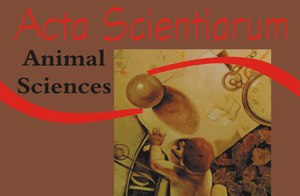This study evaluated in situ ruminal degradability of grains of linseed, canola, rapeseed and corn, whole cottonseed, as well as soybean hulls and soybean meal, in sheep. Three Santa Inês sheep were fistulated and fitted with rumen cannulas. The animals were housed in individual stalls, receiving chopped grass and concentrated feed daily. Feeds were incubated in descending order of 72, 48, 24, 18, 6, 3 and 0h. Protein content was 34.77% for canola, 30.07% for rapeseed, 23.70% for linseed, 10.64% for corn, 26.12% for cottonseed, 14.65% for soybean hulls, and 56.90% for soybean meal. Canola and rapeseed showed low effective degradability of DM, with mean value of 33.68%. Linseed grain had DM degradability of 64.24%, with 87.89% potential degradable fraction. Corn grain showed soluble fraction of 12.33% and 39.67% degradation for DM. Soybean meal was within normal parameters of degradation, with 52.61% for DM and 52.83% for CP. For linseed, canola and rapeseed, average protein degradability value was 18.34%. The evaluated grains showed low effective degradability for dry matter and crude protein.
chemical composition; rapeseed; linseed; in situ
